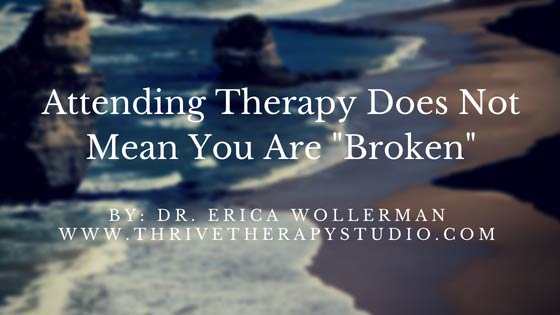I can’t tell you how often the topic of being “broken” or “damaged beyond repair” comes up in my therapy sessions. I believe that asking for help in the form of therapy is one of the most courageous steps someone can take. It is incredibly brave to reach out and say that you may need more support as well as to take the time to tell your story to a complete stranger. This is why it’s a big deal to me when someone reaches out to us to start the process of therapy for either themselves or their child or teen!
Interestingly, people who are asking for help definitely typically do not feel brave or courageous. Unfortunately, our culture leads people to feel that they are weak or flawed for needing help. This frustrates me for many reasons but a big one is that it makes it so incredibly hard for people to get to a place where they are okay receiving therapy and help. So often, people tell me that they are “broken, damaged, and a problem,” when they come into therapy. It is so sad for me to hear that they feel this way but provides a valuable opportunity for us to discuss what this means and why they feel that way.
A favorite topic of mine when this sentiment comes up with my clients is to share about Kintsukuroi, which is the “Japanese art of mending broken pottery using lacquer resin laced with gold or silver” (reference from Wikipedia). Essentially, this practice means that when something breaks, it is not thrown away or considered broken, trash, damaged, etc., but it is then transformed into something new and even more beautiful. I find this to be such a beautiful philosophy and completely parallel to what I notice as a therapist about people who have struggled, and at times struggled in incredibly difficult ways. People are not weak, broken, or damaged when they have experienced struggle and allow themselves to come out on the other side of that struggle. If they allow themselves to process through the struggle and to allow growth to happen despite the awful things that may have happened in their lives, they often grow and develop into someone more empathic, understanding, strong, and beautiful.
This brings up the concept of post-traumatic growth, which is the personal growth that can sometimes come from trauma. While no one would ever wish for trauma or say that they are glad a traumatic event happened (I certainly wouldn’t), many of my clients do acknowledge that because of the trauma or challenge they have experienced in their lives, they are different and often “better” people in some way that they appreciate. It is like the cracks were filled in with gold or silver just like a piece of Japanese pottery.
At Thrive, we take a positive, client centered approach to therapy that is focused on creating a genuine connection with our clients. If you would like to talk with a Thrive Therapist about yourself, your child, or teen attending therapy, please reach out to us by phone at (858) 342-1304.
As always, thanks for reading and comments are always welcome regarding any issues around child or teen psychotherapy services in San Diego by Thrive Therapy Studio.
To stay in the loop on the services offered and to receive updated information about Thrive, please feel free to sign up for the newsletter through the following link: http://eepurl.com/cvGx5n.
Reach out to start
your healing journey


